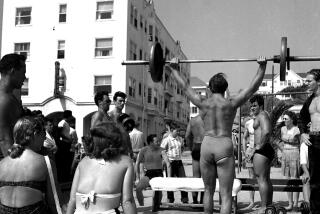Powerlifter Sought for Sale of Steroids
- Share via
NEW YORK — Among some 16,000 fugitive felons being hunted by U.S. marshals is a British powerlifter, Richard Anthony Fitton, wanted for smuggling massive shipments of steroids into the country--for under-the-counter sales to athletes.
Fitton, a 242-pound British powerlifting champion in 1977, disappeared April 10 when he forfeited his $7,500 bail and failed to show up for sentencing in U.S. District Court in San Diego.
He had been scheduled to be sentenced two weeks before, but his lawyer requested a postponement because Fitton, 33, had checked into a hospital in Alabama for treatment of high blood pressure.
Fitton was convicted in 1982 in Atlanta for illegally importing steroids but was slapped with only a one-year suspended sentence. This time the U.S. Attorney’s office was going to recommend that he serve a 5-year prison term and another five years on probation. The prison term would have probably resulted in his deportation.
The native of Rochdale, a town north of Manchester, England, had pleaded guilty to charges of conspiracy, giving false statements to U.S. Customs officials and illegally importing a prohibited substance--some 6,600 milliliters of an injectable steroid, Dianabol, and other prescription drugs found in the trunk of his rented car at the Tecate, Calif., border.
“He was not only arrested at the site with steroids, but the investigation by Customs indicated a large amount of steroids” were to be picked up later in Mexico, said Assistant U.S. Atty. Phillip Halpern.
Carlos Cortez-Bustamante, the owner of Farmacias Castro International, a drug store in Tijuana, told Customs officals in December that he was holding four cases of steroids for Fitton.
Fitton is “certainly one of the four or five largest” steroid dealers in the country, Halpern said. “He’s a profiteer attempting to make money selling drugs that are probably harmful to the people taking them.”
Anabolic steroids are synthetic hormones, legally dispensed by prescription, that help build up muscles and tissues--but which also can cause side effects such as liver damage, decreased sperm production for men and may lead to the hardening of arteries, high blood pressure and disorders of blood clotting.
The strength building powers of steroids make them a powerful lure for athletes despite their potential health hazards.
South Carolina and Tennessee officials discovered this year that tens of thousands of steroids were illegally distributed to college athletes by their coaches and other students at Vanderbilt, Clemson and Colgate universities.
A Vanderbilt weight coach is awaiting trial, and former strength and track coaches at Clemson have pleaded guilty to misdemeanor offenses, earning fines up to $2,000, up to three years on probation and are required to perform more than 800 hours of community service.
Federal officials say Fitton offered his wares to lifters at competitions.
“If there’s a meet and Tony’s at it, you can count on that he’s got a couple suitcases full of drugs that he’s going to sell off that place,” said Charles Radler in a statement to prosecutors in San Diego.
Radler, former owner of a Pittsburgh drug supply outfit now serving a two-year prison term for selling steroids, said Fitton would show up at a meet, rent a hotel room and soon lifters would be lining up in the hall.
“It’s his weight-loss room if you need to make weight,” Radler said. Fitton would “shoot them all up with Lasix (a diuretic used to treat horses as well as people), blow their water off and they make weight.”
“Everybody knew of Tony’s activities, but nobody thought much about it because it was an accepted thing,” said Larry Pacifico of Dayton, Ohio, a former American powerlifting champion who gave Fitton a job in a health spa when he moved to the United States in 1978.
“Tony is a terrific guy, and he’s very knowledgeable in the field of powerlifting,” said Pacifico, who said he last saw his missing friend over Thanksgiving weekend at the 1984 powerlifting championships in Dallas.
Powerlifting is a branch of weightlifting which includes bench presses, squats and dead lifts. Olympic lifting involves hoisting weights overhead.
Fitton, who has a Category 2 referee rating by the International Powerlifting Federation, often refereed at meets, said Conrad Cotter of the U.S. Powerlifting Federation. Cotter said he had never seen Fitton selling drugs at meets and could not recall the last time the Briton officiated at an event.
More to Read
Sign up for Essential California
The most important California stories and recommendations in your inbox every morning.
You may occasionally receive promotional content from the Los Angeles Times.











